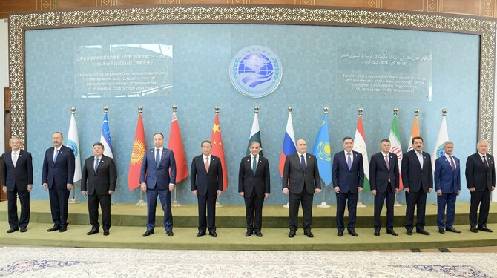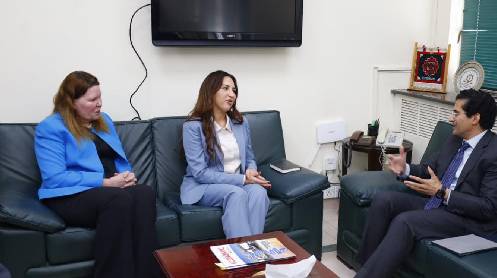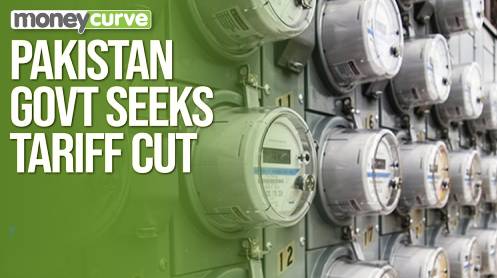PM Shehbaz chairs summit; eight key documents on bloc’s budget, secretariat, and counterterrorism efforts signed
SCO members reject Western sanctions, call for the use of national currencies in trade
Joint communique urges closer cooperation in politics, security, and the establishment of an SCO Development Bank
India expresses concerns over cross-border terrorism, affecting trade and connectivity efforts
ISLAMABAD: Leaders of the Shanghai Cooperation Organisation (SCO) on Wednesday reaffirmed their unwavering support for China’s Belt and Road Initiative (BRI) despite India’s objections, which blocked a full consensus on the project. The meeting, chaired by Prime Minister Shehbaz Sharif, concluded with a strong show of unity among most member states, as they criticized Western sanctions and protectionist trade practices.
The 23rd Council of Heads of Government (CHG) meeting, held in Islamabad, brought together leaders from Belarus, China, Iran, Kazakhstan, Kyrgyzstan, Pakistan, Russia, Tajikistan, and Uzbekistan. The discussions revolved around promoting regional cooperation, enhancing connectivity, and boosting economic growth, with the BRI taking center stage. India, represented by its External Affairs Minister Subrahmanyam Jaishankar, maintained its critical stance on the BRI due to concerns about China’s influence in the region, particularly through the China-Pakistan Economic Corridor (CPEC), which runs through disputed territories.
Strong Support for BRI and Regional Infrastructure
In the joint communique issued at the conclusion of the summit, the leaders of SCO member states, including Pakistan, Russia, Iran, and Central Asian nations, reaffirmed their commitment to the BRI, citing its potential to transform the regional economic landscape by developing transport networks, energy infrastructure, and trade corridors. The document highlighted that the BRI, alongside the Eurasian Economic Union (EAEU), could serve as a bridge for enhanced cooperation across the region.
Prime Minister Shehbaz Sharif, who presided over the session, stressed the need to expand the BRI and integrate it with other regional initiatives, such as the International North-South Transport Corridor (INSTC) and CPEC, to improve connectivity across roads, railways, and digital infrastructure. He called on the member states to avoid viewing these projects through narrow political lenses, advocating for a collaborative approach that would benefit all participants.
“Investment in regional infrastructure projects, such as transport and energy corridors, is crucial for economic integration. Projects like the Belt and Road Initiative (BRI), China-Pakistan Economic Corridor (CPEC), and the International North-South Corridor (INSC) can significantly enhance connectivity,” PM Shehbaz said.
Sanctions and Economic Cooperation
The leaders were united in their opposition to unilateral Western sanctions, which they argued undermine the sovereignty of affected nations and disrupt global trade. Countries like Russia and Iran, both heavily sanctioned by Western powers, were vocal about the economic damage caused by these measures. Russian Prime Minister Mikhail Mishustin described the sanctions as an obstacle to global cooperation and economic growth but reaffirmed Russia’s focus on unlocking internal potential and strengthening its national economy.
Iran’s Minister for Trade and Industry Seyyed Muhammad Atabak described the sanctions as “economic terrorism” and called for SCO’s collective action against such practices. He emphasized that sanctions not only affect targeted nations but also create ripple effects on third-party countries and global economic relations.
In a strategic move to reduce dependence on Western currencies, the joint communique called for increasing the use of national currencies in mutual settlements among SCO member states. This decision aligns with the bloc’s long-term goal of reducing the dominance of the US dollar and other Western currencies in global trade, giving SCO members greater control over their economic interactions and financial policies.
Proposal for SCO Development Bank and Financial Institutions
A key outcome of the summit was the decision to accelerate consultations on establishing the SCO Development Bank and the SCO Development Fund (Special Account) to support infrastructure projects and economic development initiatives across member states. These financial institutions would aim to provide alternative funding for key sectors like energy, transportation, and telecommunications, helping to reduce reliance on Western financial institutions.
Prime Minister Shehbaz Sharif welcomed the proposal, noting that the creation of an SCO alternative development funding mechanism would provide the impetus needed to unlock various stalled initiatives. Chinese Premier Li Qiang also emphasized the importance of these financial institutions in boosting regional trade, investment, and economic integration.
Regional Security and Stability
While economic cooperation dominated the discussions, regional security was another key focus, especially in the face of rising challenges like terrorism, extremism, and organized crime. Chinese Premier Li Qiang urged member states to strengthen joint actions against the “three evils”—terrorism, extremism, and separatism. He proposed the creation of a comprehensive center to respond to security threats and challenges, alongside a dedicated drug control center to combat transnational crime.
Prime Minister Shehbaz Sharif raised concerns about cross-border terrorism, specifically referring to security challenges emanating from Afghanistan. He called on the SCO to pressure the Taliban-led government to prevent Afghan soil from being used by terrorist groups targeting neighboring countries, including Pakistan. Furthermore, he urged the Taliban administration to ensure political inclusivity in their governance, a rare public call from a leader of a Muslim-majority country.
India’s Concerns and Criticism
Despite the SCO’s prohibition on discussing bilateral disputes, Indian External Affairs Minister Subrahmanyam Jaishankar took the opportunity to criticize Pakistan indirectly, linking cross-border terrorism with economic connectivity. Jaishankar remarked that activities across borders characterized by terrorism, extremism, and separatism are unlikely to foster trade and people-to-people exchanges.
In a thinly veiled reference to Pakistan, he stated, “If trust is lacking or cooperation inadequate, if friendship has fallen short and good neighbourliness is missing somewhere, there are surely reasons to introspect and causes to address.”
India has long been concerned about the security implications of CPEC, which runs through the Gilgit-Baltistan region, claimed by both India and Pakistan. This has been a point of contention in India’s reluctance to fully support the BRI.
Environmental and Cultural Cooperation
In addition to economic and security issues, SCO leaders also emphasized the need for joint action on climate change and stronger cooperation on environmental protection. They highlighted the importance of building climate resilience and acknowledged the role of cultural diversity and people-to-people diplomacy in fostering regional harmony.
The summit concluded with the signing of eight key documents, addressing the organization’s budget, the functioning of the SCO secretariat, and regional counterterrorism initiatives. These agreements aim to streamline the organization’s operations and bolster its efforts to combat transnational security threats.
Conclusion
The 23rd Council of Heads of Government meeting of the SCO underscored the bloc’s commitment to enhancing regional connectivity, expanding economic cooperation, and addressing shared security concerns. Despite India’s reservations about the Belt and Road Initiative, the summit demonstrated the collective resolve of most member states to move forward with China’s ambitious infrastructure plan. With discussions on establishing new financial institutions and reducing reliance on Western currencies, the SCO is positioning itself as a significant player in reshaping the regional and global economic landscape.
Story by Baqir Sajjad Syed





